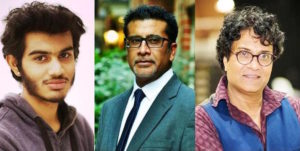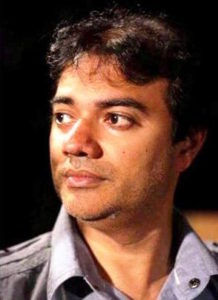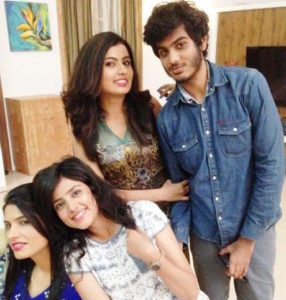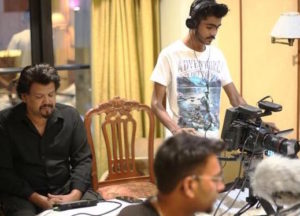Vijaypath a film made by local Indian diaspora

Nivish Chandra, Nayesh Radia and Vijay Jogia
By Dr. Satish Rai
VJPATH-Vj4Victory is essentially a Bollywood film because it was filmed in India (Mumbai, Lucknow and Pune) and all its female cast and several male casts playing minor and junior roles are all from Bollywood and other parts of India. The filming crew is from Bollywood and initial post-production work was also done in India. Needless to say, majority of the locations and studious where the film is filmed is in India. According to the demand one scene was filmed in Sydney.
That’s where the Bollywood connection largely ends because VJPATH does not fit into any of the main types of films that have been made in India since Dadasaheb Phalke produced its first silent feature film Raja Harishchandra in 1913. To start with the Producer, the Writer/Director/Editor, the main production team and all the lead male actors are from the Indian diaspora. More significantly, all of them have origins in the girmit diaspora; being descendants of the indentured Indians transported to the British colonies from 1826 to 1917. The VJPATH film team are descendants of Fiji, Tanzania and Malawi, now living in Sydney and London.
VJPATH-VJ4Victory does not sit neatly in any of the main genres (Parallel, Masala and Middle Cinema). The producer of the film, Ron Chandra, did not entertain Masala movie at all for this movie. Hence the choice was between parallel and middle cinema. VJPATH straddles best of the parallel and middle cinema minus the mandatory 5-6 songs that have become integral part of middle cinema and are often filmed out of sync with spine of the story. In fact four great songs have been recorded and filmed in India for this film. But the producer is now deciding not to include the songs in the film because of two main reasons. First, inclusion of the songs will make the film too long; the film is already 140 mins long. Second, he feels that the inclusion of songs may adversely affect the flow of the beautifully crafted story of the film.

Producer Ron Chandra
For the producer, the story of his first film was extremely important. He has had a very long connection with Bollywood; being credited with bringing stage shows of Shahrukh Khan, Salman Khan, Akshay Kumar and Sadashiv Amrapurkar to Australia and South Pacific in 1990s. It is the story of VJPATH that drew his attention to this film project and he concluded that it will be the perfect launch pad for his son Nivish Chandra in Bollywood.
Ron Chandra had already worked with me, as writer and director of VJPATH some eighteen years ago on Australia’s first independent free to air television channel and was aware of all his film and television work since 1997. He liked what he saw and thus began collaboration on VJPATH in 2016.
What also sets VJPATH apart from any of the Bollywood film production is that all the main male cast and production team is from Australia and UK. However the crew and all the main female cast are from Bollywood. The producer has acquired the latest version of Black Magic cinematic camera and battery operated production equipment for best quality and ease of production. The latest version of DaVinci Resolve 14 editing software ensured par excellence technical quality of VJPATH.
The primary shooting of the film was completed in 24 days. Adhering to the parallel and middle cinema ingredients of working with newcomers and unknown artists, VJPATH stars newcomers from Bollywood and the Indian diaspora. Both the producer and the director are very pleased with the works of these brilliant actors. VJPATH will be released in India and throughout the Indian diaspora soon.
One of the highlights of VJPATH-VJ4Victory is to watch how the four male actors have acted in Hindi and held their own opposite the female and other Bollywood cast.

Nivish with actress Kirandeep Kaur, Reshma Karma and Jagruti Patel
Seventeen year old Nivish Chandra, the lead male actor is born in Sydney; his parents being born in Fiji, who migrated to Australia after the coups in Fiji. Nivish’s first language is English and mother tongue is Fiji Baat (talk). He did not receive any formal training in what is know as shuddh (pure) Hindi; what he has learnt of this language is through Bollywood films and Hindi songs. His excellence in memorising his lines written in English and delivering them with confidence of a seasoned actor should alone make us proud as descendants of the girmitiyas. While many children living in the west, and even in India find it hard to speak in Hindi, this teenager has demonstrated that when the opportunity arose, he excelled in the language of his girmitiya ancestors. The accent in which Nivish speaks Hindi adds to the beauty of the diasporic Bollywood film. Nivish’s effort to learn and speak Hindi in his first feature film is exemplary and should act as motivation to millions of youngsters in India and in the Indian diaspora who shy away from Hindi and consider English as superior and impressive.

Writer/Director Satish Rai at the sets
As writer, director and one of the lead actors in VJPATH my formal Hindi education was seven years only several decades ago in Fiji, and my mother tongue being Fiji Baat, with formal language of instruction being English. I migrated to UK in 1980 and hardly spoke any form of Hindi for the next 15 years. I re-learned Fiji Hindi when I migrated to Australia in 1995. In 1997 I wrote my first screenplay in ‘Bollywood Hindi’ and since then have written two more screenplays in Bollywood Hindi; my main language of creative writing since1993 being English.
Nayesh Radia, the third lead actors in VJPATH was born in the east African national of Malawi. He migrated to UK an very young age with his family after the turbulence that eventuated in East Africa and settled in London. His mother tongue is Gujarati and I am yet to know how and when he learnt to speak Hindi, most probability from the Bollywood films.
Vijay Jogia makes the fourth actor from the girmit diaspora in VJPATH. He was also born in East Africa in Tanzania. Like Nayesh, he migrated to UK with his family at young age and settled first in Leicester and later in Sydney, Australia. His mother tongue is also Gujarati. He is a popular Hindi singer and most probably did not have any formal education in Hindi.
The two actors of Guajarati origin from the girmit diaspora bring to the film their unique brand of acting and dialogue delivery in Bollywood Hindi, adding to the intrigue of this innovative film. The ability for the four male actors, who were born in the girmit diaspora, to speak in Hindi in a Bollywood movie should send out a clear message to those Indians who are now choosing to speak in English for no other reason than to impress others.
The producer of VJPATH hopes that the Indians in India as well as in the Indian diaspora here will support the film not only for its cinematic excellence, but also because this film has been made in India largely by the descendants of Girmitays who were transported from India to work for the Europeans who were also ruling over India in that period of history.
VJPATH is a significant breakthrough for Indian diaspora film production in India and the producer hopes that the success of this film will persuade more filmmakers from the old Indian diaspora to make films in India.
Short URL: https://indiandownunder.com.au/?p=10163
